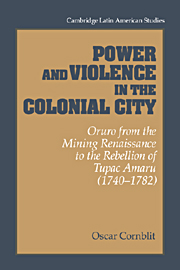 Power and Violence in the Colonial City
Power and Violence in the Colonial City Book contents
- Frontmatter
- Contents
- List of figure, maps, and tables
- Preface
- Map 1 Present-day Bolivia and surrounds
- Map 2 Principal routes of the Viceroyalty of Peru (second half of the eighteenth century)
- 1 Oruro between two epochs: a mining cycle
- 2 Under Spanish law
- 3 Oruro in 1741: details of a stormy election
- 4 The people
- 5 “Madmen, comedians, and hypocrites”
- 6 Captains of shipwreck
- 7 Returning to the known
- 8 “The fruits of the earth”
- 9 The end of an epoch: the Indian uprisings of 1780–1781
- 10 Oruro in the economic and geopolitical context of the epoch (c. 1780–1781)
- 11 The Oruro uprising
- 12 The voice of the rebels
- 13 Picking up the pieces
- Appendix A Indian raids on Oruro, 1781: testimonies
- Appendix B Testimonies of inhabitants of the city
- Appendix C Table of public jobs in Oruro, 1730–1784
- Bibliography
- Index
- CAMBRIDGE LATIN AMERICAN STUDIES
Preface
Published online by Cambridge University Press: 30 March 2010
- Frontmatter
- Contents
- List of figure, maps, and tables
- Preface
- Map 1 Present-day Bolivia and surrounds
- Map 2 Principal routes of the Viceroyalty of Peru (second half of the eighteenth century)
- 1 Oruro between two epochs: a mining cycle
- 2 Under Spanish law
- 3 Oruro in 1741: details of a stormy election
- 4 The people
- 5 “Madmen, comedians, and hypocrites”
- 6 Captains of shipwreck
- 7 Returning to the known
- 8 “The fruits of the earth”
- 9 The end of an epoch: the Indian uprisings of 1780–1781
- 10 Oruro in the economic and geopolitical context of the epoch (c. 1780–1781)
- 11 The Oruro uprising
- 12 The voice of the rebels
- 13 Picking up the pieces
- Appendix A Indian raids on Oruro, 1781: testimonies
- Appendix B Testimonies of inhabitants of the city
- Appendix C Table of public jobs in Oruro, 1730–1784
- Bibliography
- Index
- CAMBRIDGE LATIN AMERICAN STUDIES
Summary
History books often contain the implicit assumption that the events of the past can be interpreted in only one way, and that this vision of history underlies the book in hand. This is not my point of view. I believe that there are many ways to explain history, and furthermore that they are not necessarily mutually exclusive. In certain cases one kind of explanation might even require elucidation from one or several of the others.
The choice of a style of explanation or a combination of several styles depends closely on the author's purposes – purposes that might be predictive, rhetorical, narrative, expressive, or pedagogical, among others. Moreover, underlying all of these is a system of ontology, whether explicitly stated or not.
Philosophically speaking, this means that our conceptions of the nature of the world may be different. In historical interpretation, one crucial issue is our conception of the nature of past events. Are they simply there waiting to be told, or does our description alter them? Further, do historical events repeat themselves with some degree of similarity or not?
It is not my intention in this preface to discuss problems that would require a great deal more space than I have available here. I will indicate only that the predominant explanatory mode in this book is a narrative one. There are discrete kinds of narratives; each contains different combinations of rhetorical conceptions about the course of events, hypotheses about the causal links between them, and overall views about social reality.
- Type
- Chapter
- Information
- Power and Violence in the Colonial CityOruro from the Mining Renaissance to the Rebellion of Tupac Amaru (1740–1782), pp. vii - xPublisher: Cambridge University PressPrint publication year: 1995


